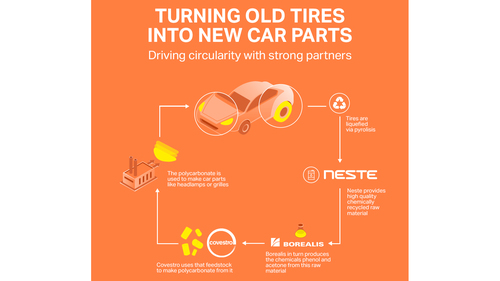From old tires to new car parts: Neste, Borealis and Covestro aim at closing the loop for automotive industry
Neste, Borealis and Covestro have signed a project agreement to enable the recycling of discarded tires into high-quality plastics for automotive applications. The collaboration aims at driving circularity in plastics value chains and the automotive industry. When no longer fit for use, tires are liquefied by means of chemical recycling and then processed into base chemicals and further into polycarbonates of high purity. These can then be used in various automotive applications, from parts of headlamps to radiator grilles.
“Circularity requires cooperation, and this cooperation with our partners Neste and Borealis is testament to the possibilities at our disposal,” says Guido Naberfeld, Senior Vice President, Head of Sales and Market Development Mobility at Covestro. “We are creating options to turn discarded materials from cars into new car parts again. With that, we are supporting our automotive customers and addressing an increasingly prominent question discussed across the value chain: How to match high-performance materials with recycled content? Projects like this can be the answer.”
As part of the collaboration, Neste turns liquefied discarded tires into a high-quality raw material for polymers and chemicals manufacturing and supplies it to Borealis. Borealis will then process the Neste-produced raw material into base chemicals phenol and acetone, which are supplied to Covestro. Covestro can use these materials to make polycarbonates. The share of recycled content is attributed via the mass balancing approach all the way to the final products using ISCC Plus certification.
The first products based on the collaboration are already available as each party has manufactured the first batch of their respective contribution to the project. Aside from polycarbonates, the project partners may also consider polyurethanes as a possible end product, which could also find its way into parts of the interior of a car. The companies emphasize that the potential to scale-up these types of developments should be considered when setting ambitious targets for future EU regulations, such as the End-of-Life Vehicles Regulation.
“We are demonstrating the importance of value chain cooperation to give new value to waste,” says Thomas Van De Velde, Senior Vice President Base Chemicals at Borealis. “We are proud that Borealis, in collaboration with Neste, is able to play a role in this project, providing more sustainable solutions for polymer applications for Covestro and its customers.”
“This project can serve as a blueprint when it comes to establishing circularity in the field of plastics in cars,” says Jeroen Verhoeven, Vice President Value Chain Development for polymers and chemicals at Neste. “It shows how low-quality waste materials can be turned into very high-quality plastics. This is good news for the polymers and automotive industries as well as for the environment.”
Downloads
Latest news
BASF becomes first producer of renewable ammonia in Central Europe at Ludwigshafen, Germany
BASF SE, Ludwigshafen →Renewable energy-derived hydrogen replaces fossil hydrogen in production process. Expansion of ammonia value chain with further sustainable products.
MSSA doubles production capacity for sodium methylate in La Rochelle, France
The strategic investment will double MSSA's annual production capacity for sodium methylate from 20,000 tonnes to 40,000 tonnes, reinforcing the company's commitment to meeting the growing demand f...
Dreexo Energy to Launch Circular Economy Plant in Cádiz, Advancing Sustainable Industry in Andalucía
Construction of a new facility in the Cádiz Free Trade Zone. The project is expected to break ground in early 2026 and be operational by year’s end.
Vioneo appoints Wood to design world’s first industrial scale fossil-free plastics facility in Antwerp, Belgium
Port Of Antwerp →the renewably powered and energy efficient plant will be the first facility in the world capable of achieving the production of fossil-free plastics using green methanol at an industrial scale.



